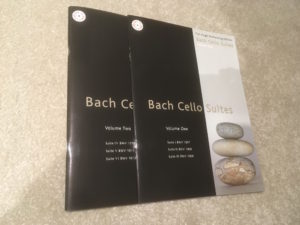
Tim Hugh. Bach Cello Suites. Originally released on CD 2005. LSO Live 1183.
Release reviewed is package printed by Kevin Mayhew ISMN M 57024 4164. Titled Tim Hugh Performing edition. This is a manuscript of the Bach Suites edited by Tim Hugh and inspired by Anna Magdalena’s copy. Free CDs of the 2005 recording are included! Issued as two separate volumes.
Introduction.
So, what we have here is an excellent value combo! A different edition of the music for any keen cello student with CD performances thrown in. This edition is still available. It is obtained direct from the publisher if not found in other sheet music retailers.
The Cellist.
Tim Hugh, for many years the principal cellist with the London Symphony Orchestra, is now recently moved to the Royal Opera house. He is an active soloist with many orchestras performing notably, an excellent recording of the Finzi cello concerto with the Northern Sinfonia.
Confession.
If like me, you are guilty of assuming that a principal cellist is one who couldn’t quite make the grade as a full time concert soloist then be prepared for correction!
Medical student days.
But first, allow me to take you to you a time when I am a medical student. It is about 1981/2. I am on an attachment at a Midlands obstetric unit when I meet up with a very personable student from another medical school. He plays the violin and can be heard practicing at week ends. He is clearly very talented and we have a number of conversations. In those chats he is very keen once aware I play the cello, to tell me proudly of his younger brother who is an up and coming cellist-his name Tim Hugh! He does such a good job promoting his brother that I make a mental note of his name.
Sure enough in just a few years I am hearing his name on the radio as a cellist of distinction.
Sadly, the older brother died suddenly from a heart condition very young.
Unfortunately, over the ensuing 40 years I have failed to keep an eye on Tim Hugh’s career and so this recording is the first of his I have listened to with any focus.
The Recording.
I have to say I find this performance hugely enjoyable, absorbing and admirable. It’s a very consistent performance so I will make little reference to individual movements.
The sound quality is very smooth, refined and a little lacking in dynamics I suspect due to positioning of microphones. In this connection the cello sounds a little further back than is the norm in modern recordings.
There is no unpleasant echo or extraneous noises from the performer bar some finger tapping in the sixth Suite Prelude.
The Music.
Hugh impresses with a very light seemingly effortless touch which imbues the music with gentleness and warmth. There is occasional assertiveness particularly in Gavottes but no aggression or forced notes. The phrasing is controlled and purposeful. Technically the performer sounds at ease, the Sixth Suite Gigue being controlled but exciting to the end. In this last movement there is a stand out contrast of very spiky quavers towards the end of the first section (bar 17 looking at the supplied manuscript!) with lovely legato and flowing double stopping seven bars later.
There is an overall feeling of relaxation, and the music flows steadily with no abrupt changes of tempo. The rhythm is tight at all times preserving the dance feel of the majority of movements.
Culture and Refinement.
In many ways although the interpretation and phrasing is very different, this performance reminds me of that by Pierre Fournier. Culture and refinement is what I feel is imparted.
In the forward to the music copy, Hugh suggests that the edited manuscript is for modern performance implying it is not historically informed (HIP). However, in many aspects this is a rendition which takes the best of modern playing and set up and blends it with the best of (HIP) recordings. There is no scratchy sound, as in many authentic performances. there is no overblown vibrato and excessive melodrama as in some modern renderings. Instead, there is the lightness of touch I favour in HIP.
The Fourth Suite Prelude demonstrates this well. It flies along at a rapid pace with 2 beats to the bar rather than 4, but is so precise and light that it becomes the stand out movement of the six Suites.
The Fifth Suite Sarabande is very ethereal aided by the light almost wispy tone.
Conclusion.
In summary, this is now one of my favourite recordings and one I recommend to both a new listener to the Suites as well as any seasoned listener, particularly those used to early Starker, Rostropovich and Gendron. The latter will either experience a revelation or hate it!
Charles.